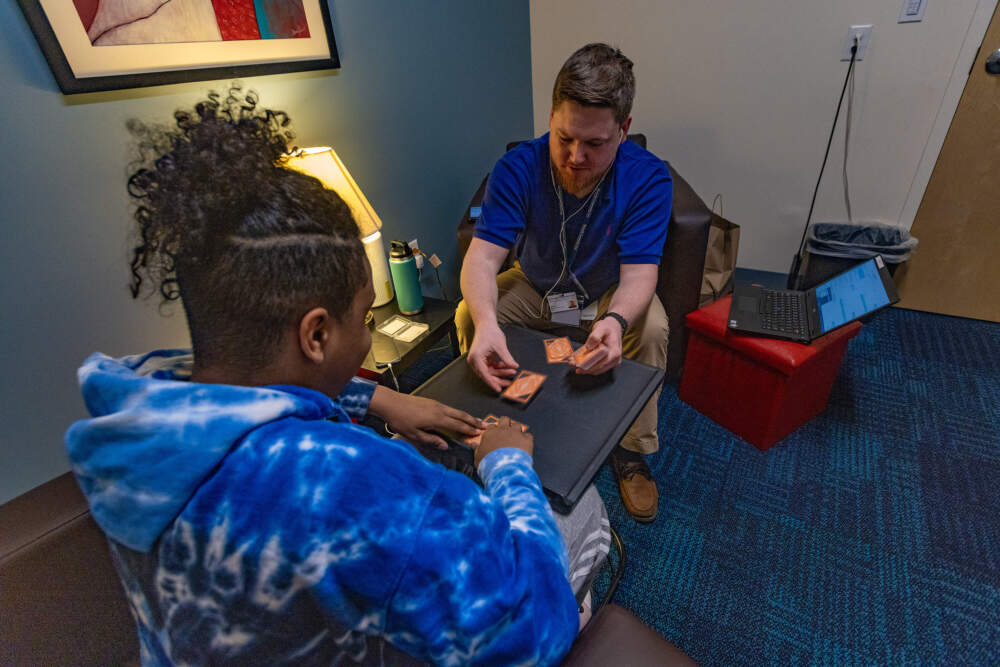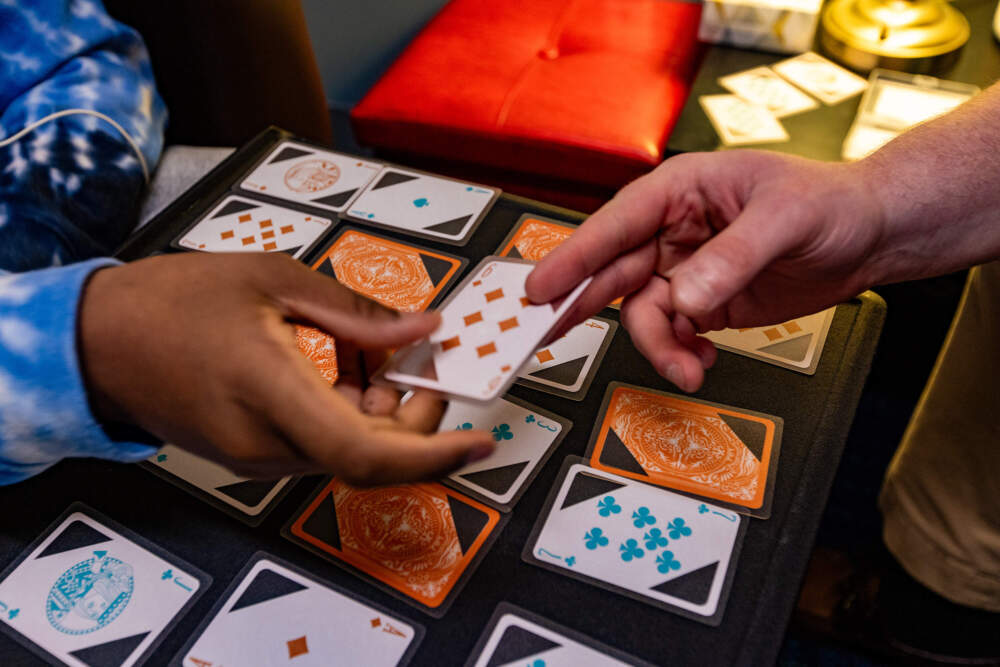Advertisement
Peer support transforms mental health care for some in Massachusetts
Resume
There’s a quiet sea change underway in some mental health care settings in Massachusetts and beyond — and it often looks a lot different from therapy.
People who’ve struggled with bipolar disorder, depression, anxiety and other conditions are joining the mental health workforce to support patients experiencing some of the same difficulties they've worked to cope with or overcome.
Their titles vary but include “certified peer specialist” and “young adult peer mentor.” They work alongside therapists and others, sometimes in offices with comfy chairs and white noise machines. But their goals often emphasize building connections over clinical work.
Support through fun
“I’m poppin’ bro, I’m poppin’,” hollered Nathaniel, a 16-year-old frantically flipping cards in a game called Trash. His opponent, Jake Look, is a certified young adult peer mentor at Riverside Community Care Center in Milford.
“It ain’t over yet,” countered Look. That turned out to be wishful thinking. Nathaniel racked up another win.
"I’ll always beat you, bro,” he said with a sly laugh. WBUR agreed not to use full names for Nathaniel or his family members, because the family is concerned discrimination can trail mental health patients.
In his 45-minute session with Look, there was no mention of medications or behavioral therapy. Look asked a few questions about Nathaniel’s home life and school, as well as issues he’s working on with a more traditional therapist. But Nathaniel just wanted to play.

“When I started this role, if we didn’t get into intimate feelings, I felt like the session was almost a failure,” said Look. “But, 45 minutes of play could be the best part of his week. It’s about giving Nathaniel ownership of those 45 minutes.”
Nathaniel has quit therapy in the past. But he says he never hesitates to come see Look and his social worker at Riverside, Sean Smith.
“I could tell both of them anything and since they're like my team, they can talk to each other,” Nathaniel said. “So then they can always make sure that I'm OK.”
But there are some topics he finds it easier to talk to Look about. Drugs and alcohol, for example.
“Sean could just say, ‘that’s a bad thing, don’t do it,’ ” Nathaniel said. “Jake’s got more flexibility to be real.”
Look is part of a youth treatment team at Riverside that includes clinical social workers and psychiatrists. Riverside is one of about 30 community behavioral health centers in Massachusetts, a state designation for facilities that provide a range of mental and behavioral health care services, all under one roof.
Many of the centers have employed peer specialists for a decade or longer, and they’re now adding more under a mental health “Roadmap” Massachusetts launched in 2023. The initiative aims to improve access to mental health care, recruit more industry professionals and encourage wider use of nonconventional staff like peer specialists.
“These roles are game changers entirely,” said Brooke Doyle, commissioner at the state’s Department of Mental Health.
"When I started this role, if we didn’t get into intimate feelings, I felt like the session was almost a failure. But, 45 minutes of play could be the best part of his week."
Jake Look
Doyle believes young adult peer mentors like Look could play a critical role as more and more teens and young adults grapple with mental health challenges. Doyle said she’s been impressed by how peer workers initiate therapy through fun activities like sidewalk chalk drawing or video games, and eventually connect clients to other support teammates.
“Using non-traditional ways,” said Doyle, “really is the bridge to those other services.”
But bringing peer specialists onto the clinical team doesn’t work if they are isolated or their input on clinical decisions isn’t respected, Doyle said. Vic DiGravio, the president at Riverside where Look works, said he’s seeing some of those tensions play out as the center integrates more peer specialists into care teams.
“It is still a work in progress, because it is a culture shift,” DiGravio said. “But even with that, it’s impossible to underscore how innovative and transformative this has been in 14 months and the potential for transforming the system moving forward.”
Stepping into this role has been transformative for Look, too. In his late teens and early 20s, Look said he used drugs and alcohol to cope with anxiety and depression, experiences he’s ready to share.
“There was a point in my life where I felt like I was so ashamed of it,” Look said. “But now it's really become a powerful tool for me. And it's something that I can use as a representation of hope for others.”
Nathaniel said he still gets angry, anxious and depressed at times. But his grandmother and guardian, Mirabel, said he’s much better.
“In school, his grades are awesome,” she said. “His behavior is changed. And he’s proud of himself, finally.”
“I could tell both of them anything and since they're like my team, they can talk to each other. So then they can always make sure that I'm OK.”
Nathaniel
According to the Kiva Centers, a training program for certified peer specialists, there are currently more than 600 young adult peer mentors in Massachusetts. The workers take training courses that run about two weeks depending on their speciality and must pass a test to receive certification.
In the mental health field, there are unique roles for family partners and older adult peer specialists in addition to young adult peer mentors. Peer workers known as recovery coaches work in many areas of addiction treatment.
While peer specialists won’t fix the broader shortage of mental health workers, they can expand options for patients and providers, said Amie Sica, Riverside’s director of recovery and peer services. Some young people at Riverside might spend a lot of their time with a young adult peer mentor. Other treatment plans will be more focused on psychiatry or sessions with a social worker, she explained.
The personalization of treatment programs is possible, Sica said, because the state’s Medicaid program gives community behavioral health centers a lump sum payment for mental health care and lets the centers decide how to spend it.
“The bundled rate gives us a lot more flexibility to meet the individualized needs of every single person who works through our doors,” Sica said.
The state’s largest private insurers have not set up a similar arrangement with community behavioral health centers, so patients with private insurance do not typically have access to all the options, including young adult peer mentors, that Nathaniel receives.
That’s one way Massachusetts is behind some other states, said Dr. Ken Duckworth, chief medical officer with the National Alliance on Mental Illness. He would like to see support for peer specialists grow quickly.
“There’s no big effort to create more psychiatrists, psychologists and social workers,” said Duckworth. “So the opportunity is for peer support to become a material part of the equation for what helps people get better.”
This segment aired on May 2, 2024.
